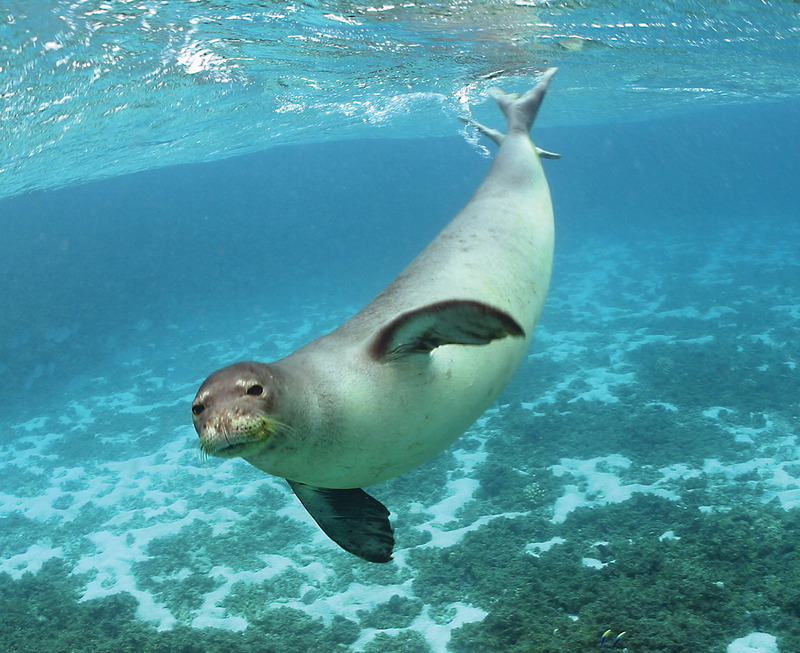Hawaiian Monk Seal
From Wikipedia, the free encyclopedia
Order: Carnivora
Family: Phocidae
[Photo] Hawaiian Monk Seal (Monachus schauinslandi). Author James Watt. Source Cropped from www.doi.gov/photos/highresolution/monkseal.jpg License: public domain.
The Hawaiian Monk Seal (Monachus schauinslandi) in the Family Phocidae, is an endangered marine mammal that is endemic to the warm, clear waters of the Hawaiian Islands. `Ilio-holo-i-ka-uaua as it was known to the indigenous people of Hawaii, received its name Monachus schauinslandi because the first skull known to science was brought back from Laysan Island by Dr H. Schauinsland. It gets its common name from its round head covered with short hairs, giving it the appearance of a medieval friar. The name may also reflect the fact that the Hawaiian Monk Seal lives a more solitary existence, in comparison with other seals that in places collect in large colonies. The Hawaiian Monk Seal comes from ancestors that go far back in time and are the most primitive living members of the Family Phocidae, having separated from other true seals perhaps 15 million years ago.
Features
Mature Hawaiian Monk Seals feature a gray pelage, or coat which turns brown with weathering. Young Hawaiian Monk Seals are silver with creamy white bellies, chests and throats. Pups are black and woolly with fuzzy short hair. Newborn pups are clad in a black natal fur. Hawaiian monk seals tend to sport scars from attempted shark attacks or injuries from fishing gear. Females are often scarred by encounters with males, who can be particularly brutal during the mating season. If numbers of males take an interest in a single female, they will often kill her. Females of any age can be fair game, including pups. Adult males are 300 to 400 pounds in weight and at 7 feet in length while adult females tend to be 400 to 600 pounds and at 8 feet in length. Pups average at 30 to 40 pounds at birth and at 40 inches in length. Life expectancies are from 25 to 30 years.
Endangered Species
Hawaiian Monk Seals are one of the most endangered species of all seals, although its cousin species the Mediterranean Monk Seal (M. monachus) is equally rare, and the Caribbean Monk Seal (M. tropicalis), last seen off Yucatan, became extinct in the 1950s. It is estimated that fewer than 1,400 Hawaiian Monk Seals exist today (2004). The Hawaiian Monk Seal was officially designated as an endangered species on November 23, 1976 and is now protected by the Endangered Species Act and the Marine Mammal Protection Act. It is illegal to kill, capture or harass a Hawaiian Monk Seal.
Monk seal species have shown alarming population declines in recent years due to the rapid spread of human activity to even the most remote and isolated areas in the NWHI. In the past, Hawaiian Monk Seals were clubbed to death for meat, oil and their skin. In Hawaii, the following factors have contributed to the seal's decline: death from predation by sharks, reduced pup survival as the result of human disturbances, ciguatera poisoning, high male to female ratios during the breeding season, and entanglement in fishing nets and debris.
Considerable current research is being conducted on this species including research conducted by the U.S. National Oceanic and Atmospheric Administration in conjunction with the Marine Mammal Center. These efforts are directed at the enhancement of population as well as health issues of this species.
More Photos
http://commons.wikimedia.org/wiki/Monachus_schauinslandi
http://en.wikipedia.org/wiki/Hawaiian_Monk_Seal
| The text in this page is based on the copyrighted Wikipedia article shown in above URL. It is used under the GNU Free Documentation License. You may redistribute it, verbatim or modified, providing that you comply with the terms of the GFDL. |
|

